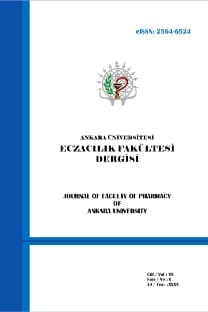TOPLUM ECZACILARININ KİLO VERME ÜRÜNLERİNE KARŞI ALGISI: KAHRAMANMARAŞ İLİ ÖRNEĞİ
Algı, bilgi, kilo verme, obezite, toplum eczacıları
PERCEPTION OF COMMUNITY PHARMACIST TOWARD WEIGHT LOSS PRODUCTS: KAHRAMANMARAŞ CITY SAMPLE
Community pharmacists, knowledge, obesity, perception, weight loss,
___
- 1. Hruby, A., Hu, F. B. (2014). The epidemiology of obesity: A big picture. PharmacoEconomics, 33(7), 673–689. [CrossRef]
- 2. Bhat, S. P., Sharma, A. (2017). Current drug targets in obesity pharmacotherapy – A review. Current Drug Targets, 18(8), 983–993. [CrossRef]
- 3. Kissane, N. A., Pratt, J. S. (2011). Medical and surgical treatment of obesity. Best practice & research. Clinical anaesthesiology, 25(1), 11–25. [CrossRef]
- 4. Clements, J. N., Shealy, K. M. (2015). Liraglutide: An injectable option for the management of obesity. The Annals of Pharmacotherapy, 49(8), 938–944. [CrossRef]
- 5. Whitten, J. S. (2016). Liraglutide (Saxenda) for weight loss. American Family Physician, 94(2), 161-166.
- 6. Rosenthal, M., Ward, L. M., Teng, J., Haines, S. (2018). Weight management counselling among community pharmacists: A scoping review. The International Journal of Pharmacy Practice, 26(6), 475–484. [CrossRef]
- 7. Um, I. S., Krass, I., Armour, C., Gill, T., Chaar, B. B. (2015). Developing and testing evidence-based weight management in Australian pharmacies: A Healthier Life Program. International Journal of Clinical Pharmacy, 37(5), 822–833. [CrossRef]
- 8. Boardman, H. F., Avery, A. J. (2014). Effectiveness of a community pharmacy weight management programme. International Journal of Clinical Pharmacy, 36(4), 800–806. [CrossRef]
- 9. Gómez-Martinez, J., López-Pintor, E., Lumbreras, B. (2020). Effectiveness of a Patient-Centered Weight Management Model in a Community Pharmacy: An Interventional Study. Patient Preference and Adherence, 14, 1501–1511. [CrossRef] 10. Hijazi, M. A., Shatila, H., El-Lakany, A., Al Rifai, H., Aboul-Ela, M., Naja, F. (2020). Role of community pharmacists in weight management: Results of a national study in Lebanon. BMC Health Services Research, 20(1), 386. [CrossRef]
- 11. AlMukdad, S., Zaghloul, N., Awaisu, A., Mahfoud, Z. R., Kheir, N., El Hajj, M. S. (2021). Exploring the role of community pharmacists in obesity and weight management in Qatar: A Mixed-Methods Study. Risk Management and Healthcare Policy, 14, 2771–2787. [CrossRef]
- 12. Bates, I., John, C., Bruno, A., Fu, P., Aliabadi, S. (2016). An analysis of the global pharmacy workforce capacity. Human Resources for Health, 14(1), 61. [CrossRef]
- 13. Newlands, R. S., Watson, M. C., Lee, A. J. (2011). The provision of current and future Healthy Weight Management (HWM) services from community pharmacies: A survey of community pharmacists' attitudes, practice and future possibilities. The International Journal of Pharmacy Practice, 19(2), 106–114. [CrossRef]
- 14. Fakih, S., Marriott, J. L., Hussainy, S. Y. (2015). A national mailed survey exploring weight management services across Australian community pharmacies. Australian Journal of Primary Health, 21(2), 197–204. [CrossRef]
- 15. Krska, J., Lovelady, C., Connolly, D., Parmar, S., Davies, M. J. (2010). Community pharmacy contribution to weight management: Identifying opportunities. The International Journal of Pharmacy Practice, 18(1), 7–12. [CrossRef]
- 16. Lunsford, K. E., Bodzin, A. S., Reino, D. C., Wang, H. L., Busuttil, R. W. (2016). Dangerous dietary supplements: Garcinia cambogia-associated hepatic failure requiring transplantation. World Journal of Gastroenterology, 22(45), 10071–10076. [CrossRef]
- 17. Yen, M., Ewald, M. B. (2012). Toxicity of weight loss agents. Journal of medical toxicology: Official journal of the American College of Medical Toxicology, 8(2), 145–152. [CrossRef]
- 18. Nimptsch, K., Konigorski, S., Pischon, T. (2019). Diagnosis of obesity and use of obesity biomarkers in science and clinical medicine. Metabolism: Clinical and Experimental, 92, 61–70. [CrossRef]
- 19. Zieck, M., Um, I. S., Chaar, B. B. (2018). The future of weight management in pharmacy education - Perspectives of new generation pharmacists. Currents in Pharmacy Teaching & Learning, 10(5), 596–601. [CrossRef]
- 20. Awad, A., Waheedi, M. (2012). Community Pharmacists role in obesity treatment in Kuwait: A cross-sectional study. BMC Public Health, 12, 863. [CrossRef]
- 21. Peletidi, A., Kayyali, R. (2019). Experiences of the pharmacy-led weight management service: Views of service providers in England. Pharmacy, 7(3), 82. [CrossRef]
- 22. Verma, R. K., Paraidathathu, T., Taha, N. A., Chong, W. W. (2019). Attitudes, practices, and barriers of Malaysian community pharmacists toward provision of weight management services. Frontiers in Pharmacology, 10, 138. [CrossRef]
- 23. Ahrens, R. A., Hower, M., Best, A. M. (2003). Effects of weight reduction interventions by community pharmacists. Journal of the American Pharmacists Association, 43(5), 583-589. [CrossRef]
- 24. Clements, J. N., Albanese, N. P., D'Souza, J. J., Misher, A., Reece, S., Trujillo, J., Whitley, H. P. (2021). Clinical review and role of clinical pharmacists in obesity management: An opinion of the endocrine and metabolism practice and research network of the American College of Clinical Pharmacy. Journal of the American College of Clinical Pharmacy, 4(11), 1469-1484. [CrossRef]
- ISSN: 1015-3918
- Yayın Aralığı: 3
- Başlangıç: 2016
- Yayıncı: Ankara Üniversitesi Eczacılık Fakültesi
TOPLUM ECZACILARININ KİLO VERME ÜRÜNLERİNE KARŞI ALGISI: KAHRAMANMARAŞ İLİ ÖRNEĞİ
Nilay AKSOY, Nazlı Gül ERDOĞAN
Nihal KARAKAŞ, Mehmet Evren OKUR, Tuğba SAĞIR, Damla ULUDAĞ, Derya Çiçek POLAT, Ayşe Esra KARADAĞ
Heybet Kerem POLAT, Sedat ÜNAL
İNDOMETAZİN İÇEREN YÜZEN-PULSATİL İÇİ BOŞ BONCUKLARIN HAZIRLANMASI VE İN-VİTRO KARAKTERİZASYONU
Emrah ÖZAKAR, Hasan Burak GÜNEŞ, Rukiye SEVİNÇ ÖZAKAR
TOFİSOPAM’IN OPİOİDERJİK SİSTEM ARACILIKLI ANTİNOSİSEPTİF ETKİNLİĞİ
Nazlı TURAN YÜCEL, Umut İrfan ÜÇEL, Cevşen YAZICI, Ümide DEMİR ÖZKAY, Özgür Devrim CAN
Rukiye SEVİNÇ ÖZAKAR, Şeyma ASAN, Azra Elisa ÖZKAN, Emrah ÖZAKAR
Betül AKALIN, Zeynep DÖRTBUDAK
Mefküre DURMUŞ, Selim GÖK, Ömer Faruk BAHÇECİOĞLU, Zeynep Ülkü GÜN, Süleyman Savaş HACIEVLİYAGİL
TABLETLERDE GLİKLAZİT MİKTAR TAYİNİ İÇİN SPEKTROFOTOMETRİK YÖNTEM GELİŞTİRME VE DOĞRULAMA
